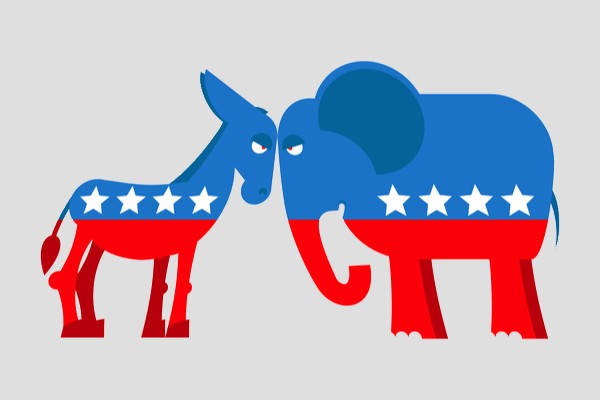
High-profile Republican politicians such as Elise Stefanik, the nominee for US ambassador to the United Nations, have also been elevated into powerful positions within the new Trump administration in part for their strident pro-Israel positions.
By Dion J. Pierre, The Algemeiner
American Jews believe the Republican Party is handling antisemitism better than the Democratic Party, according to a new poll conducted by the American Jewish Committee (AJC).
The poll, which collected responses between Oct. 8 and Nov. 29 but was released on Wednesday, revealed that Jewish Americans hold widespread skepticism about how US politicians are handling the ongoing surge in antisemitism across the country.
Among respondents, only 39 percent indicated support for how the Democratic Party “is responding to antisemitism in the United States.” In comparison, 59 percent responded that they were “dissatisfied” with how the Democrats are handling the problem.
Meanwhile, the Republican Party performed better among Jewish American respondents, with 45 percent indicating “approval” and 54 percent indicating “disapproval” with how the GOP has handled antisemitism
Democrats have found themselves embroiled in controversy over their party’s handling of antisemitism following the Hamas-led massacres across southern Israel on Oct. 7, 2023.
Democratic leaders were harshly criticized for adopting what they deemed a soft approach to combating the rising tide of anti-Jewish hate within left-wing circles.
High-profile progressive Democratic lawmakers such as Reps. Rashida Tlaib (D-MI), Ilhan Omar (D-MN), Alexandria Ocasio-Cortez (D-NY), and Summer Lee (D-PA), have spent the past year launching a barrage of insults against Israel, oftentimes accusing the Jewish state of committing a “genocide” against Palestinians as retribution for the Oct. 7 terrorist attacks.
In November, 17 Democratic senators voted to implement a partial arms embargo against Israel, incensing many Jewish American organizations and pro-Israel supporters who view deep hostility and the application of double standards to the world’s lone Jewish state as an indicator of antisemitism.
Republicans in the US Congress have generally adopted a more hardline stance against antisemitism, launching congressional investigations against anti-Jewish bigotry on college campuses and presenting state-level legislation to adopt the International Holocaust Remembrance Alliance (IHRA) definition of antisemitism.
High-profile Republican politicians such as Elise Stefanik, the nominee for US ambassador to the United Nations, have also been elevated into powerful positions within the new Trump administration in part for their strident pro-Israel positions.
US President Donald Trump, a Republican, recently passed an executive order to crack down on antisemitism at universities and punish the harassment of Jewish students, including by deporting non-Americans on campuses who promote terrorism and hatred against Jews.
However, conservatives have struggled with surging antisemitism within their own ranks in the 16 months following the Oct. 7 atrocities.
Popular conservative podcasters Tucker Carlson and Candace Owens have circulated antisemitic content to millions of their subscribers, oftentimes outright accusing Israel of committing “genocide” against Palestinians and promoting antisemitic conspiracy theories about the Jewish people.
Both Carlson and Owens have indicated support for the “Christian Nationalist” movement — a form of religious nationalism which seeks to enshrine Christianity’s dominance in American cultural life.
According to the AJC poll, 79 percent of American Jews believe Christian Nationalism is an “antisemitic threat.”
An almost identical number of American Jews perceive left-wing and right-wing political extremism as an “antisemitic threat.”
According to the poll, 78 percent believe that the “extreme political left” and 79 percent believe that the “extreme political right” are threats to the Jewish community.
The poll also found that 54 percent of American Jews believe antisemitism is a “very serious problem,” a sharp increase from previous years, and another 39 percent said it was “somewhat of a problem.”
More than half, 56 percent, of Jews have also avoided publicly identifying as Jews to shield themselves from dealing with antisemitism, an 18-point increase from 2022.
“Antisemitism has reached a tipping point in America, threatening the freedoms of American Jews and casting an ominous shadow across our society,” AJC CEO Ted Deutch said in a statement.
“This is an all-hands-on-deck moment for leaders across the US. We must act now to protect Jews — and America — from rising antisemitism. That one-third of American Jews have been the target of antisemitism in the past year should raise red flags for every American and our leaders.”
The survey also revealed that there is still widespread support for Israel among the Jewish community in the United States. According to AJC, 81 percent of American Jews stated that they cared about Israel because it was “important.”
The poll also indicated rising pro-Israel sentiment among younger generations, with 40 percent of those aged 18 to 29 claiming Israel was “very important” to them, an 11-point surge from the previous year.
The post American Jews believe Republicans handling antisemitism better than Democrats, poll finds appeared first on World Israel News.